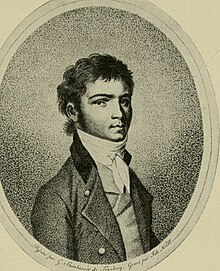Piano Sonata No. 6 (Beethoven)
This article needs additional citations for verification. (December 2024) |

Ludwig van Beethoven's Piano Sonata No. 6 in F major, Op. 10, No. 2, was dedicated to the Countess Anne Margarete von Browne, and written from 1796 to 1798. It was published in Vienna by Joseph Eder in 1798. [1]
The sonata spans approximately 14 minutes. [2]
Form
[edit]The sonata is divided into three movements: [2]
- Allegro in F major
- Menuetto. Allegretto in F minor
- Presto in F major
First movement
[edit]The first movement is in sonata form. The development is based on the C–G–C tag which concludes the exposition, with no clear use of any other material from the exposition. The recapitulation is unusual because the 1st theme returns in D major before modulating back to tonic for the second theme.
Second movement
[edit]The second movement is a minuet in F minor with a trio, with the return of the minuet strongly embellished. It is more reminiscent of Beethoven's bagatelles than of most of his minuets. The trio, in D♭ major, has a hint of anticipation of the third movement of Symphony No. 1.
Third movement
[edit]The third movement is in sonata form, with a fugal development. The exposition has theme 1 in F major and a closing section in C major. The recapitulation is unusual because the 1st theme is a fugal variation instead of a literal repeat. The movement has a coda based on the closing section.
External links
[edit]- A lecture by András Schiff on Beethoven's piano sonata Op. 10, No. 2
- For a public domain recording of this sonata visit Musopen
- Piano Sonata No. 6: Scores at the International Music Score Library Project
- ^ Thought, Fugue for (2017-05-30). "Beethoven Piano Sonata No. 6 in F, Op. 10, No. 2". Fugue for Thought. Retrieved 2024-12-21.
- ^ a b "Piano Sonata No.6, Op.10 No.2 (Beethoven, Ludwig van) - IMSLP". imslp.org. Retrieved 2024-12-21.




